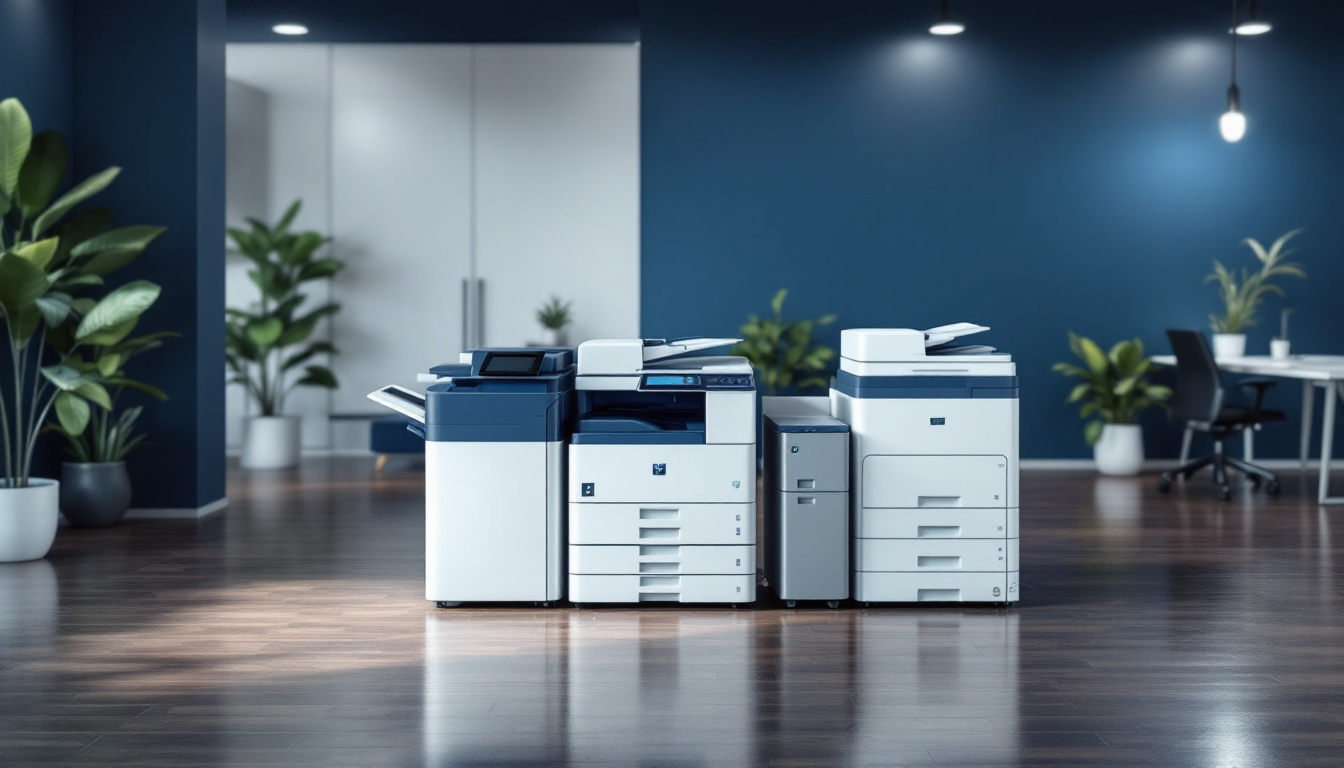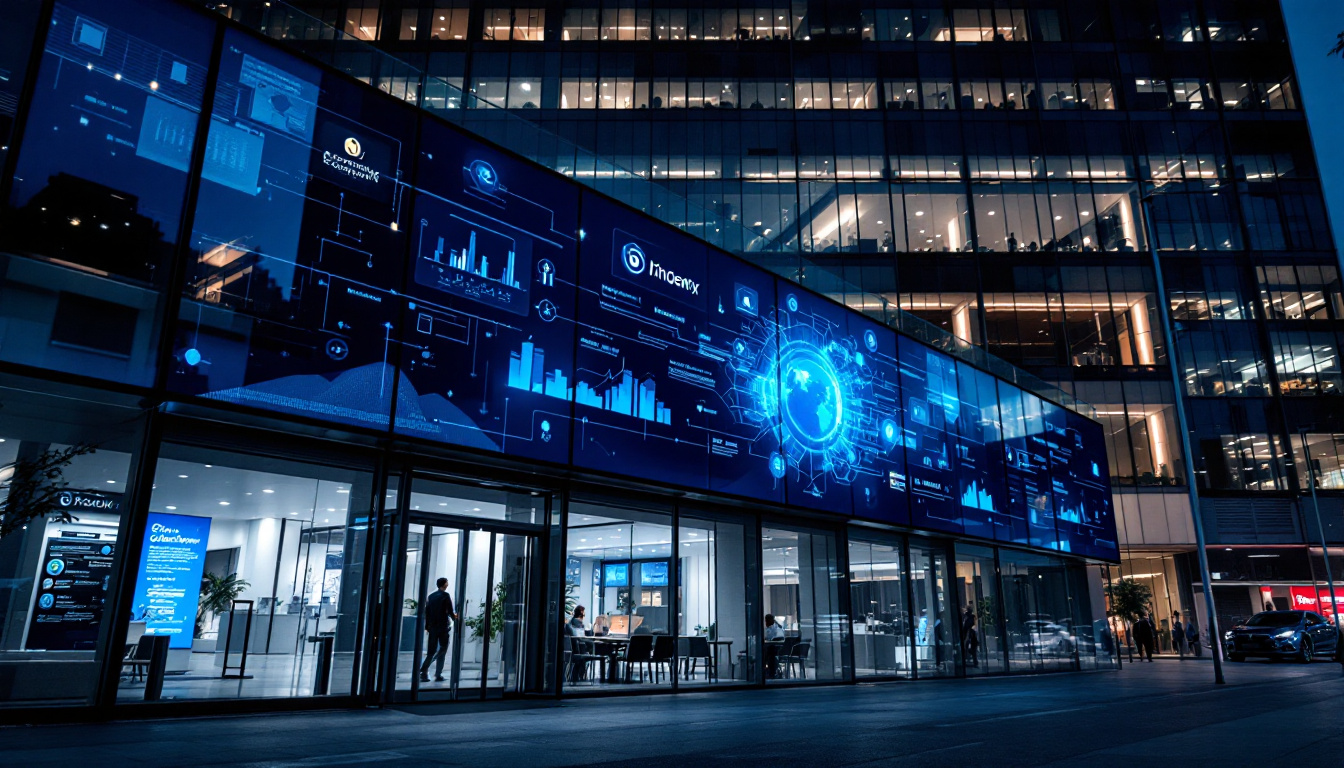Introduction
In an era marked by environmental consciousness and increasing electronic waste, copier leasing emerges as a pivotal strategy for businesses aiming to maintain operational efficiency while contributing to sustainability. As the demand for eco-friendly practices rises, understanding how leasing contributes to waste reduction and sustainable technology use can guide companies towards more responsible corporate practices.
Understanding Copier Leases

What is a copier lease?
A copier lease is a contractual agreement that allows a business to rent a copier or multifunction printer (MFP) for a specified duration, typically between 36 to 60 months. This arrangement provides businesses access to the latest technology without significant upfront costs associated with purchasing the equipment outright.
Types of copier leases
There are two main types of copier leases:
- Fair Market Value (FMV) Lease: This type of lease typically offers lower monthly payments, with an option for the lessee to purchase the equipment at market value at the end of the lease term.
- $1.00 Buyout Lease: In this arrangement, the business pays slightly higher monthly payments but gains ownership of the printer or copier for just one dollar at the end of the term.
Advantages of copier leasing over purchasing
Leasing copiers provides several benefits:
- Lower Upfront Costs: Leasing allows businesses to acquire new equipment without the high initial investment required for purchasing.
- Predetermined Monthly Payments: The leasing structure leads to predictable budgeting, avoiding unexpected repair costs.
- Access to Latest Technology: Many leasing firms offer the latest, energy-efficient models, contributing to sustainability efforts and operational cost savings.
In essence, copier leasing helps manage finances more effectively while supporting environmentally responsible practices. Additionally, by extending the life cycle of devices and promoting refurbishing and recycling, businesses align with sustainability goals, ultimately benefiting both their operations and the planet.
Environmental Benefits of Copier Leasing

How does leasing a copier contribute to environmental sustainability?
Leasing a copier contributes significantly to environmental sustainability in several ways. By opting for leasing instead of purchasing, businesses can access the latest energy-efficient models without incurring high upfront costs. This approach enables a continual upgrade to newer technologies, further minimizing energy consumption and reducing waste associated with obsolescence.
When businesses lease copiers, they also benefit from practices that promote responsible lifecycle management. Leasing companies often refurbish and reuse existing devices, allowing them to remain operational longer before ultimately being recycled or properly disposed of. This practice not only conserves raw materials but also reduces the frequency of manufacturing new devices, therefore lessening the overall environmental impact.
Moreover, leased copiers are typically energy-efficient, which further decreases the carbon footprint of businesses. Managed print services bundled with leasing agreements help optimize printing processes, promoting reduced paper and toner waste. In essence, leasing facilitates a sustainable cycle where office equipment is utilized and managed in an eco-friendly manner, contributing to broader corporate sustainability goals.
Upgrade opportunities with leased copiers
Leasing copiers allows organizations to frequently upgrade to the latest technology. This aspect promotes the use of energy-efficient machines and enables businesses to adapt to advancements without the burden of outdated equipment. Upgrading frequently leads to decreased waste as older devices are returned and recycled appropriately, rather than being prematurely discarded.
Contribution to corporate sustainability goals
Incorporating leased copiers aligns with corporate sustainability initiatives by promoting environmentally conscious practices and enhancing a company’s CSR image. By partnering with reputable leasing companies, businesses can engage in sustainable recycling measures and e-waste management, ensuring compliance with environmental regulations while simultaneously fostering a positive company reputation.
Sustainability Through Copier Leasing

What are the environmental benefits of copier leasing compared to purchasing?
Leasing photocopiers offers significant environmental benefits compared to purchasing, primarily through promoting waste reduction and sustainability.
- Reduction of Electronic Waste: Leasing enables firms to extend the life cycle of existing devices. This reuse strategy significantly minimizes the demand for new manufacturing, leading to lower levels of electronic waste.
- Energy Efficiency: Many leased models are energy-efficient, consuming less power compared to older technology. This shift helps decrease greenhouse gas emissions and operational costs.
- Responsible Disposal: Leasing companies often manage the end-of-life process for copiers, ensuring responsible recycling and refurbishment. This process is vital in preventing hazardous materials from entering landfills, thereby protecting both the environment and human health.
Lifecycle management of leased copiers
The approach to lifecycle management in copier leasing is comprehensive and sustainable. It includes:
- Preventive Maintenance: Regular maintenance extends the lifespan of devices, further reducing the turnover rate of equipment.
- Demanufacturing and Recovery: When copiers reach the end of their life, leased devices can be demanufactured. This involves carefully dismantling to recover valuable components and materials, contributing to the circular economy.
- Partnerships for Recycling: Collaborating with certified recyclers ensures that recycling practices meet environmental regulations and support resource recovery.
Eco-friendly advantages of leasing copiers
Leasing copiers has multiple eco-friendly advantages:
- Frequent Upgrades: Leasing allows businesses to upgrade to the latest technologies more frequently, which promotes the use of sustainable office machines.
- Sustainable Practices Support: Many leasing programs encourage environmentally friendly behaviors, such as reduced printing and waste through managed print services.
- Community Support: Leasing firms may also offer recycling programs for consumables like toner cartridges, aiding in overall waste reduction.
Through these various elements, copier leasing clearly aligns financial management with sustainable practices, creating a win-win scenario for businesses aiming for greener operations.
Eco-Friendly Practices in Copier Leasing

How do eco-friendly practices relate to copier leasing?
Eco-friendly practices align seamlessly with copier leasing by promoting both energy efficiency and responsible resource use. Leasing companies often provide businesses with access to the latest ENERGY STAR™-certified copiers.
These machines are designed to consume significantly less electricity—typically between 30-75% less than standard models. This not only reduces operational costs but also decreases the carbon footprint associated with printing activities.
Adoption of energy-efficient technologies
Energy-efficient copiers often feature advanced functionalities that further enhance sustainability. For instance:
- Automatic Duplexing: This feature allows for double-sided printing, effectively cutting paper consumption in half.
- Sleep Modes: Machines that automatically enter low-energy states during idle periods help minimize electricity usage.
- Remote Access: This capability enables users to manage print jobs more efficiently, reducing waste.
Sustainable material use in leased copiers
Sustainable materials play a crucial role in reducing the environmental impact of leasing. One notable example includes HP's TerraJet Toner Cartridges. Made from 35% recycled plastic, these cartridges exemplify how leasing companies strive to lessen the ecological footprint of their products.
Benefits of ENERGY STAR-certified copiers
Utilizing ENERGY STAR-certified copiers not only aids businesses in cutting costs but also strengthens their sustainability credentials. By choosing leased copiers that adhere to these eco-friendly standards, companies can effectively contribute to environmental preservation and support broader corporate social responsibility goals.
Addressing Technology Obsolescence
What are the implications of technology obsolescence on copier leasing?
The implications of technology obsolescence on copier leasing are significant. As technology advances, printers and copiers can quickly become outdated. Leasing arrangements play a crucial role in enabling organizations to access the latest devices without the burden of large upfront costs. By spreading payments over a lease term of 3 to 5 years, businesses can better manage their budgets and avoid the risks associated with owning obsolete equipment.
Leasing provides essential flexibility as companies can upgrade to newer models at the lease term's end. This adaptability is particularly beneficial in an environment where efficient and energy-saving technologies are continuously emerging. Moreover, lease payments are often tax-deductible, offering improved cash flow compared to outright purchases, which provide only partial deductions initially.
In addition, leasing helps maintain operational efficiency. Most leasing agreements include maintenance and repair services, ensuring that businesses always have access to fully functional equipment. This arrangement not only saves costs but also helps minimize electronic waste by keeping devices in use longer, thereby reducing the frequency of new purchases and conserving valuable resources. Through leasing, businesses can effectively navigate the challenges posed by technological advancements while promoting sustainability.
Role of Copier Maintenance in Waste Reduction
How does copier maintenance and repair contribute to reducing waste?
Copier maintenance and repair significantly contribute to reducing waste by extending the lifespan of leased equipment, which helps prevent premature disposal. By ensuring that the copiers remain in good working order throughout their lease term, businesses can maximize the utility of their investment without frequently needing replacements.
Leasing arrangements, such as Fair Market Value (FMV) leases, incentivize regular servicing. These agreements often rely on the equipment being maintained in excellent condition for return after the contract ends. Regular servicing not only addresses performance issues but also ensures the devices operate at peak efficiency.
Understanding the current printing volume plays a vital role in waste reduction as well. When businesses select the appropriate copier based on their needs, it minimizes excess energy and resource usage associated with over-specification.
Additionally, timely maintenance leads to improved operational efficiency. By focusing on preventive measures, companies can avoid major breakdowns that could result in extended downtimes and additional environmental costs associated with waste from disposals.
In summary, by opting for regular maintenance and repairs, businesses enhance their operational efficiency and significantly reduce their overall environmental impact, contributing positively to sustainable practices.
Leasing in the Circular Economy Framework
How is copier leasing related to the circular economy?
Copier leasing is fundamentally linked to the circular economy as it supports the principles of reuse and recycling. This model empowers businesses to leverage high-quality, advanced equipment without significant initial investments by spreading costs over time. By doing so, leasing enhances cash flow and makes cutting-edge technology accessible.
Leasing also aligns closely with sustainable practices by reducing electronic waste. Many leasing agreements incorporate maintenance and take-back programs that ensure responsible disposal or recycling once the lease term ends. This approach minimizes the environmental footprint associated with outdated devices.
By frequently upgrading to energy-efficient models, businesses can optimize their operations and effectively contribute to sustainability.
Reuse and recycling of leased copiers
Leasing companies play an essential role in the lifecycle of copiers by refurbishing and reusing existing devices. This practice not only extends the lifespan of equipment but also reduces the demand for new manufacturing, thereby lowering associated environmental impacts.
Additionally, leasing arrangements facilitate proper recycling practices. Companies often provide programs for returning used toner cartridges and other consumables, further promoting environmental responsibility.
Integration of leasing with sustainable business models
The integration of leasing in business models aligns with sustainability goals. By providing companies with energy-efficient devices, leasing decreases overall resource consumption and lessens operational costs.
Moreover, through partnerships with certified e-waste recyclers, leasing firms can ensure that any disassembled equipment is processed responsibly, supporting a circular economy that minimizes waste and maximizes recovery.
Impact of Leasing on Electronic Waste Management

How does leasing contribute to electronic waste management?
Leasing significantly influences electronic waste management by centralizing the recycling and disposal processes through the leasing companies. This structure allows businesses to manage their waste effectively and encourages sustainable practices. By leasing rather than purchasing, companies can upgrade to newer models without the hesitation of prematurely disposing of their older equipment.
Leasing agreements typically include provisions for responsible recycling or refurbishment of old devices. Companies often collaborate with certified e-waste recyclers, ensuring compliance with environmental regulations while maintaining data security. This partnership supports a circular economy by promoting the reuse of materials and minimizing waste generation.
Additionally, leasing helps businesses avoid the costs and complexities associated with disposing of outdated equipment. Instead, leasing addresses electronic waste in an organized manner, reducing the overall environmental impact caused by the rapid turnover of technology. This strategy not only protects the environment but also enhances corporate social responsibility initiatives, allowing companies to contribute positively to sustainability efforts.
Corporate Social Responsibility and Copier Leasing
How does copier leasing support corporate social responsibility?
Copier leasing supports corporate social responsibility (CSR) by aligning business operations with sustainable and environmentally-friendly practices. Through leasing, companies can consistently use the latest energy-efficient office equipment, reducing their carbon footprint and enhancing sustainability credentials.
Typically, leasing agreements include recycling and refurbishment clauses, which ensure responsible handling of equipment at the end of its life. This proactive approach mitigates electronic waste, contributing to broader environmental goals. Businesses that engage in these sustainable practices through copier leasing are often viewed more favorably, improving their corporate image and competitiveness.
Public perception and reputation management
Integrating copier leasing into corporate strategies can significantly boost public perception. As consumers and other stakeholders become increasingly conscious of environmental issues, businesses that adopt leasing models are perceived as socially responsible. This positive reputation is vital in today’s market, where branding and corporate image can influence customer loyalty.
Moreover, by leasing and recycling copiers responsibly, companies can showcase their commitment to environmental compliance, which can enhance stakeholder trust and loyalty over time.
Business opportunities through sustainable practices
Leasing copiers opens up new avenues for business opportunities. By opting for energy-efficient models, companies can also reduce operational costs associated with energy consumption. This, combined with predictable leasing expenses, makes budgeting more manageable.
Additionally, operationalizing sustainable practices through copier leasing can attract eco-conscious clients and partners, expanding market reach. In a marketplace that values CSR, businesses can leverage their commitment to sustainability as a competitive advantage, fostering growth and innovation in their operations.
Economic and Operational Benefits of Copier Leasing
What are the economic benefits of leasing copiers?
Leasing copiers provides several economic advantages that support efficient financial management. One significant benefit is predictable monthly payments. This allows businesses to plan their budgets effectively, reducing the stress of unexpected costs typically associated with ownership.
By opting to lease rather than make a substantial capital expenditure, companies can allocate their financial resources towards growth and other strategic initiatives. The flexibility to upgrade to newer, more efficient copiers also ensures they stay competitive without the risk of falling behind due to outdated technology.
Moreover, leasing agreements often come with maintenance services included. This means businesses can operate without worrying about sudden repair expenses, enhancing overall financial stability. Having these services bundled helps reduce the risk of downtime and maintains workflow efficiency, which is crucial in today’s fast-paced work environment.
Leased copiers can also feature the latest sustainable technologies, further aligning operational practices with corporate social responsibility goals. The integration of energy-efficient models helps lower overall energy consumption, contributing to both cost savings and environmental conservation.
In summary, leasing copiers not only streamlines financial management but also enables businesses to adapt rapidly to changing technological needs while promoting sustainability.
Conclusion
How does leasing reduce environmental impact?
Leasing printers and copiers can significantly lessen environmental burdens. This method helps decrease the demand for new manufacturing, which minimizes the environmental impact associated with production and distribution. Many leasing companies refurbish existing devices instead of creating new ones, effectively extending their lifecycle and reducing electronic waste.
What role does leasing play in reducing electronic waste?
Leasing copiers not only extends the lifespan of devices but also contributes to a decrease in electronic waste. Companies are less inclined to dispose of old equipment prematurely, as leasing agreements often include management of end-of-life disposal. This ensures devices are recycled or refurbished responsibly, aligning with sustainability goals.
How are resources optimally managed through leasing?
Leased devices are typically modern, energy-efficient models that consume less power than older equipment. This helps businesses lower operational costs and carbon footprints. Managed Print Services (MPS), integrated with leasing agreements, further promote environmentally-friendly practices by reducing unnecessary printing and consuming fewer resources like paper and toner.
What technologies support sustainable practices in leasing?
The incorporation of advanced technologies, such as robotics and artificial intelligence in demanufacturing processes, enhances the efficiency of recycling efforts. By optimizing the recovery of components, businesses can contribute to a circular economy, while also ensuring responsible recycling practices in an increasingly electronic waste-heavy world.
How does leasing help businesses manage costs?
Leasing models provide predictable monthly payments, making it easier for businesses to budget for office equipment. Additionally, the inclusion of maintenance services within leasing agreements reduces the likelihood of unexpected repair costs, allowing companies to focus on their core operations and reducing waste associated with malfunctioning equipment.
Conclusion
In conclusion, copier leasing not only represents a practical solution for businesses seeking cost-effective access to the latest technology but also plays a critical role in reducing electronic waste and promoting sustainable practices. By facilitating the responsible use and disposal of office equipment and aligning with circular economy principles, leasing emerges as a key strategy in achieving both environmental and operational efficiency. As companies continue to prioritize eco-friendly practices, copier leasing stands out as a pivotal element in fostering long-term sustainability and corporate responsibility. With advancements in technology and increased awareness of environmental impacts, the role of leasing is poised to grow, supporting future-focused business strategies in a rapidly evolving market.
References
- Eco-Friendly Printer Leasing | Titan Office
- Navigating the Challenges of Copier Demanufacturing and ...
- Unlocking Business Flexibility: The Untold Advantages of Copier ...
- 4 Benefits of a Copier Lease - Common Sense Business Solutions
- Save Time with Copier Rentals: Flexible Copier Lease, Printer ...
- Leasing vs Buying Printers | Kraft Business Systems
- The Advantages of Buying Refurbished Copiers
- How to Reduce E-Waste and Improve CSR in Tech - eSmart Recycling































